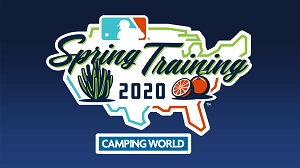The big question for Nats: Can they repeat?
This browser does not support the video element.
Every season, the World Series champions embark on Spring Training to defend their title. Yet over the course of baseball’s long history, only 14 teams have won in back-to-back years. When the Nationals' pitchers and catchers report to West Palm Beach, Fla., on Wednesday, they will begin their mission to become the first club to accomplish that feat since the 2000 Yankees 20 years ago.
The challenge is steep -- compete the entire regular season while being targeted by opponents each day and prepare for another deep playoff run after a shortened offseason -- making the list understandably short. The Yankees won consecutive titles in 1998-2000 (three in a row), 1977-78, 1961-62, 1949-53 (five in a row), 1936-39 (four in a row) and 1927-28. The Blue Jays (1992-93), Reds (1975-76), A's (1972-74, 1929-30, 1910-11), Giants (1921-22), Red Sox (1915-16) and Cubs (1907-08) complete the exclusive group.
Winning back-to-back World Series isn’t a one-person-can-do-it-all task, and that’s not how the Nationals reached this point anyway. Once again, it will require a collaborative team effort, the way they got it done in 2019.
Washington has the benefit of bringing back its starting rotation of Max Scherzer, Stephen Strasburg, Patrick Corbin and Aníbal Sánchez. Any questions of keeping this group together were answered early in the offseason when Strasburg signed a record seven-year contract on Dec. 9. Even if the Nationals don’t name a specific fifth starter, three pitchers who filled that role previously -- Erick Fedde, Joe Ross and Austin Voth -- are also returning. Collectively, the Nats’ rotation led Major League Baseball with a 23 bWAR last season.
This browser does not support the video element.
Washington also bolstered its bullpen with the signing of 2016 All-Star Will Harris, whose 1.50 ERA for the Astros was the best among qualified American League relievers last season. Harris joins Sean Doolittle and Daniel Hudson, who re-signed in January, to help lock down the late innings.
This browser does not support the video element.
With so many pitchers back from the World Series championship squad, it also means there will be extra mileage on their arms. Nationals pitchers threw an additional 153 innings in the postseason through Oct. 30. That’s a month more of game action than pitchers from non-playoff teams. Washington has prepared with a program to adjust for pitching so late into the postseason, and monitoring the pitchers on the mound will be of importance during Spring Training to counter arm fatigue when the regular season gets underway.
While the rotation is intact, addressing the vacancy left by Anthony Rendon is key to making another title run. Defensively, the Nats will take a look at Carter Kieboom, their No. 1 prospect per MLB Pipeline, at third base in West Palm Beach. The 22-year-old will have an opportunity to earn the starting job, which would be a transition from playing shortstop for the majority of last season in Triple-A. Washington also could turn to veterans Asdrúbal Cabrera, Starlin Castro or Howie Kendrick if it does not feel Kieboom is ready.
This browser does not support the video element.
Offensively, this year is an opportunity for players to stand out with their productivity at the plate. Rendon led the Nationals in runs and RBIs while tying for first in home runs in 2019. That leaves a big gap in the lineup, one that could be filled by a collective improvement. Juan Soto smacked 34 home runs in only his second Major League season, and the 21-year-old added another five in the playoffs. Adam Eaton ranked second on the Nationals in ‘19 with 158 hits, and Trea Turner was just behind him with 155. Last year among NL teams, Washington was second in batting average (.265), runs (873) and OPS (.796), tied for second in RBIs (824) and third in hits (1,460).
This browser does not support the video element.
For every pitch that is delivered, play that is made and homer that is belted, there is a manager navigating the team through each game. The experience Dave Martinez gained in just his second year at the helm will be invaluable this season. Martinez was not only tested in the playoffs, but he was also pushed to a Game 7 on the biggest of stages -- and won. After turning the team around from a 19-31 start, Martinez enters Spring Training having mastered a crash course in achieving the highest level of success so early into his managerial career.
Last season, the Nationals entered Spring Training with the uncertainty of whether they would make the postseason. Now the question is: Will they win it all again?
